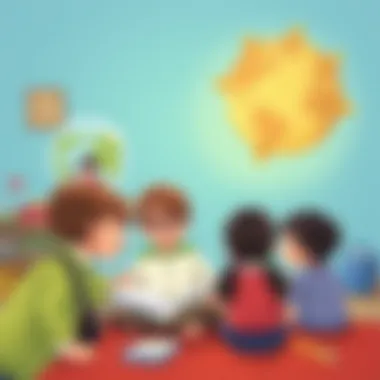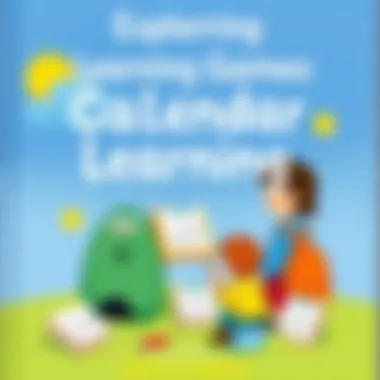Calendar Learning Games for Kids: Fun Activities


Intro
As the world becomes more fast-paced and technology-driven, the role of engaging activities that promote cognitive development in children takes on significant importance. Among various educational tools, calendar learning games emerge as standout resources for children aged three to twelve. These games not only make learning fun but also facilitate the acquisition of time management skills and sharpen cognitive abilities.
Young minds absorb information in unique ways, and calendar games provide an interactive approach to learning essential concepts about time, dates, and planning. The implementation of these games can seem daunting; however, they can be seamlessly integrated into daily routines by both parents and educators alike. In this article, we will explore types of interactive learning games, delve into popular educational topics, share tips and tricks for making learning engaging, and discuss creative DIY projects that complement these learning experiences.
The Importance of Calendar Learning Games
Playing calendar games lays the foundation for numerous cognitive skills. They encourage children to:
- Understand the passage of time: Learning about days, weeks, and months becomes tangible through hands-on activities.
- Plan and organize: Effective time management is a critical life skill nurtured through interactive play.
- Develop memory skills: Repetition of terms and concepts related to calendars helps in solidifying children's memory.
- Spark creativity: Conceptualizing their own schedules or stories based on calendar prompts allows for imagination and creativity.
With the focus on fostering these abilities, let's take a closer look at some interactive learning games designed specifically for this purpose.
Prelude to Calendar Learning Games
Calendar learning games serve as a unique integration of play and education, appealing to children’s natural instincts to explore and engage. At their core, these activities utilize everyday concepts of time—days, months, and seasons—to bolster cognitive development. By anchoring learning in a familiar framework, kids can explore numbers and concepts while enhancing their understanding of the world around them.
When children participate in calendar games, they are not merely repeating facts; they’re fostering an active learning environment. This hands-on approach is pivotal, particularly for kids aged three to twelve, as it aligns with their developmental stages and learning styles. The incorporation of games into a learning curriculum also introduces a playful element, making the process more engaging and less daunting.
Engagement is critical. It’s about drawing kids in, creating an atmosphere of curiosity, and ultimately crafting a more enriching learning experience. When kids are interested and invested in what they’re doing, their retention and understanding of concepts improve, laying a solid foundation for future learning
Instructional block on how learning through games can lead to better outcomes: Calendar learning games can facilitate memory retention, enhance critical thinking, and develop time management skills—a trifecta of competencies that contribute to the child’s educational success.
The selection of appropriate calendar games can set the stage for a dynamic learning experience. Parents, educators, and caregivers must consider not only the content but also the context in which learning happens. Will the game be played alone, in a group, or over a span of weeks? All these factors can alter the effectiveness of the learning experience.
As we proceed, this article will explore various types of calendar learning games and their distinctive contributions to cognitive growth. By understanding the theory behind these games, alongside their practical applications, we can appreciate how they’re invaluable tools in nurturing young minds.
The Cognitive Benefits of Calendar Learning
Calendar learning games offer significant cognitive benefits for young learners. Engaging with these activities not only cultivates essential skills but also creates a fun and inviting atmosphere for learning. This section dives into the specific cognitive advantages these games provide, focusing on enhancing memory, fostering critical thinking, and developing time management abilities. The integration of calendar learning activities into children's lives can serve as a cornerstone of their educational journey.
Enhancing Memory and Recall
One of the fundamental cognitive benefits of calendar learning games is their ability to enhance memory and recall. Kids, much like sponges, readily absorb information, but the trick lies in making that information stick. Calendar games often use repetition in a playful manner, reinforcing dates, events, and sequences in an enjoyable format.
For instance, a game that involves matching holiday dates with their significance can help children not only memorize these holidays but also understand their importance. When kids play these games regularly, they strengthen neural pathways associated with memory retention. This kind of active engagement often proves much more effective than rote memorization.
A few methods to boost memory through calendar learning include:
- Visual Aids: Using colorful calendar visuals captures children's attention and enhances retention.
- Storytelling: Weaving stories around calendar dates engages their imagination and anchors memories.
- Associative Learning: Encouraging children to associate dates with personal experiences can reinforce their memory.
Calendar games create connections that go beyond dates; they build memories that last a lifetime.
Fostering Critical Thinking Skills
Calendar learning games also play a pivotal role in the development of critical thinking skills. These games challenge children to draw connections, analyze situations, and develop problem-solving abilities. When faced with calendar-based challenges, such as planning a week of activities or determining the sequence of upcoming events, children must assess multiple variables and make decisions.
This involves not just recalling facts but applying them in real-world scenarios, a skill that proves invaluable later in life. For example, when children learn to plan a project using a calendar, they engage in prioritization and time allocation, vital components of critical thinking. Simple questions like, "What should be done first?" or "Which days are best for this activity?" require evaluating options and foreseeing potential outcomes.
Here are some effective ways games foster critical thinking:
- Scenario-Based Challenges: Presenting real-life situations for kids to solve encourages analytical thinking.
- Group Discussions: Collaborative games that require team input can lead to diverse thought processes.
- Reflection Points: After games, reflecting on choices made can solidify critical thinking skills.
Developing Time Management Abilities
Emerging time management abilities are another noteworthy cognitive benefit linked with calendar learning games. In an age where multitasking is the norm, who wouldn’t benefit from honing their time management skills? Calendar activities teach children not only to recognize time but also to allocate it efficiently.
For instance, a game that involves organizing tasks over a week solidifies the concept of scheduling activities in a structured manner. Children learn to visualize their commitments and understand the importance of setting priorities.
Here are some strategies that can help develop time management through calendar activities:
- Daily Planning: Encouraging children to set daily goals or tasks can nurture a habit of planning.
- Time Blocks: Teaching them to allocate specific time frames for different types of activities reinforces effective time usage.
- Reflection: After completing tasks or games, discussing what worked and what didn't helps them adjust their approach in future tasks.


Types of Calendar Learning Games
The world of calendar learning games unfolds an array of unique activities that cater to various interests and learning styles. These games not only provide fun but also deliver significant educational value. Understanding the different types of calendar games allows parents and educators to choose the most suitable options to enhance cognitive skills and engage children actively.
Interactive Digital Calendar Games
In an ever-evolving digital landscape, interactive digital calendar games have become a favorite among children and educators alike. These games offer a dynamic approach to learning by combining technology with educational content. Often featuring animated graphics and sounds, these digital experiences captivate children’s attention, making the abstract concepts of time and scheduling tangible.
One notable example is an app that allows children to create their own digital calendars, integrating personal events like birthdays or school activities. By dragging and dropping events, kids not only learn about dates, but they also begin to grasp sequencing and prioritization—a crucial skill in today’s busy world.
Engagement is key. As children complete tasks within these games, they earn rewards that can be motivating, providing a sense of achievement akin to leveling up in a video game. Additionally, many of these digital platforms come with analytics features to help parents and educators track learning progress, which can be invaluable in tailoring experiences to individual needs.
Physical Calendar Board Games
While digital might be all the rage, physical calendar board games provide a tactile, hands-on approach that can be just as effective. These games often involve boards that resemble calendars, with pieces or tokens that players move around to create events or complete challenges.
For instance, a popular board game might include different seasons, where players must plan activities such as planting seeds in spring or organizing a holiday party in winter. Through this playful interaction, children learn about the cyclical nature of time and develop an appreciation for planning ahead.
Moreover, physical games foster face-to-face interactions, which is crucial in building both social skills and teamwork. Children negotiate, strategize, and celebrate wins together, creating memorable experiences that digital platforms, much as they engage, might not replicate fully.
Incorporating such games into monthly family game nights could transform mundane learning into moments of joy, where laughter and learning go hand in hand.
Seasonal and Holiday Calendar Activities
In the realm of calendar learning, seasonal and holiday-themed activities offer rich opportunities to integrate cultural understanding and temporal awareness in fun ways. These activities can range from crafting seasonal decorations to creating a countdown calendar for the days leading up to a holiday, engaging children’s creativity while teaching them about significant dates throughout the year.
Consider, for example, a Thanksgiving countdown calendar. Children can make a paper chain with links representing each day leading up to the holiday, decorating each link with things they’re thankful for. This activity not only helps them learn about gratitude but also reinforces counting skills and the concept of days elapsing.
Furthermore, incorporating traditions from different cultures allows children to explore a broader worldview, fostering inclusivity and empathy. As children participate in these activities, they learn to associate certain times of the year with specific events, enhancing their understanding of social timelines and history.
"Learning through seasonal and holiday activities allows children to engage with their environment while appreciating the nuances of time-related concepts in a hands-on manner."
Overall, the types of calendar learning games discussed—digital, physical, and seasonal—each bring something unique to the table. By thoughtfully implementing these games, parents and educators can create a rich tapestry of learning experiences that prepare children for the complexities of time management and cognitive development.
Implementing Calendar Learning Games at Home
Integrating calendar learning games into the home environment plays a crucial role in enhancing children’s cognitive development. This approach allows parents and caregivers to actively engage their kids in learning while seamlessly integrating it into daily routines. When fun activities like these are part of a child’s day, they become learning moments that extend beyond traditional classroom settings.
By using calendar games, parents can boost their children's understanding of time management, improve their memory, and reinforce basic math skills. The goal is not just about learning. It’s about making connections between academic concepts and real-life experiences. This direct engagement can significantly deepen a child’s understanding and retention of new information. Families can adapt games according to their unique schedules, interests, and developmental stages of their children for maximum effectiveness.
Incorporating into Daily Routines
Making calendar learning games a part of daily routines is essential. It's not just about how often the games are played; it's about how naturally they fit into the family's day-to-day life. For instance, starting the day by discussing what day it is and what activities are planned can set a positive tone. Here are a few simple ways to weave games into daily practices:
- Morning Check-ins: Begin the day by reviewing the day’s events, like school schedules or appointments, and use a calendar to visualize it. Wouldn’t it be wonderful if kids could move from simply memorizing dates to understanding the concepts behind them?
- Meal Time Discussions: During dinner, talk about what was learned in the day’s games. Using examples from their calendar activities can help cement these ideas in their minds.
- Bedtime Routines: End the day by reflecting on what time certain events happen, reinforcing the concepts of time measurement and the importance of organization.
Engaging kids in short dialogues not only reinforces the learning but keeps their minds sharp and aware of their environment.
Scheduling Weekly Game Nights
One of the most effective strategies for incorporating calendar learning games at home is to establish a weekly game night. This designated time creates anticipation and excitement, allowing families to carve out dedicated time for learning and enjoyment together. Here are a few tips to get started:
- Choose a Consistent Day: Pick a day that works for everyone, whether it’s Friday or Sunday, and stick to it. Consistency builds expectation.
- Select a Variety of Games: Rotate between interactive digital calendar games, board games, or even creative DIY calendar projects. This variety will keep children engaged and interested over time.
- Get Everyone Involved: Involve siblings, parents, and even extended family. The more people, the more laughter and learning! This collaborative approach reinforces social skills and encourages teamwork.
Implementing this gamified approach at home can turn learning into a bonding experience. Children will look forward to learning and remember it more effectively, giving them a solid foundation for their educational pursuits.
In the end, integrating calendar learning games into everyday life offers fantastic opportunities for families to explore cognitive development together, making each moment a building block for future success.
Utilizing Calendar Games in Educational Settings
Integrating calendar games into educational settings can be a game-changer for both teachers and students. These engaging tools not only make learning fun but also instill critical concepts like time management and sequential thinking in a playful way. When used effectively, they can bridge the gap between theoretical knowledge and practical application, enriching the overall educational experience.
Integrating with Lesson Plans


To successfully integrate calendar games into lesson plans, teachers might think of it as embedding the spices in a dish. You want just the right amount to enhance the flavor without overpowering the core ingredients of the lesson. Here’s how one can do this:
- Identify Learning Objectives: Before jumping into the fun, it’s vital to clarify what you’re aiming for. Is it improved memory retention? Understanding months and days? Get that sorted first.
- Select Appropriate Games: Choose calendar games that align with your objectives. For example, if the goal is to understand seasons, a game that asks students to match months to their respective seasons can be valuable.
- Adapt to Subject Matter: Consider the subject you’re teaching. Calendar games can fit into math (calculating future dates), science (seasonal changes), or general knowledge (important historical dates). Adaptation is key!
- Create an Engaging Environment: Encourage competition and collaboration in a friendly way. Groups can engage in races to solve calendar-related questions, ensuring they are actively participating.
- Review and Reflect: After the game, bring the class back together to review what they’ve learned. Discussion about strategies, what worked, and what didn’t can improve future implementation.
Promoting Collaborative Learning
When it comes to promoting collaborative learning, calendar games shine. They can serve as a social platform where students collaborate, communicate, and work together toward a common goal. Here’s how to leverage this collaborative spirit:
- Group Dynamics: Assign students into diverse groups with varied strengths and weaknesses. Different perspectives can lead to more creative solutions during the game.
- Role Assignments: Ensure each student has a role in the activity, whether it's a facilitator, a scribe, or even a timekeeper. This keeps everyone engaged and accountable.
- Shared Goals: Setting a common goal, like completing the calendar challenge within a set timeframe, fosters teamwork. Competition against the clock can motivate students to support one another.
"Group efforts can strengthen understanding, as discussing answers can help clarify concepts further."
- Peer Teaching Opportunities: After conducting a game, allow students to explain their strategies to their peers. This not only reinforces their understanding but encourages them to communicate effectively.
- Feedback Loops: Establish a feedback mechanism where groups can share thoughts on what strategies were effective, allowing all participants to learn from each other’s experiences.
Utilizing calendar games in educational settings, therefore, goes beyond mere entertainment. With thoughtful integration, they can foster critical skills such as teamwork, problem-solving, and effective communication, vital for students growing in any environment.
Best Practices for Calendar Learning Games
When it comes to maximizing the educational potential of calendar learning games, understanding best practices is vital. These games can significantly uplift cognitive abilities, but they must be implemented with thoughtful consideration. Focus on the specific elements that make these games successful in nurturing young minds. Here’s a closer look at effective practices that parents and educators should embrace.
Engaging Age-Appropriate Activities
Choosing activities that match the children's developmental stage is crucial. For example, preschoolers might benefit from simple matching games that involve colors, shapes, or seasons. Picture-based calendars that allow them to visually relate time with vibrant imagery can be delightful.
For older children, activities could evolve to involve planning scenarios. Games could include scheduling tasks for the week or using a digital calendar to manage events like family gatherings or school projects. Involving them in the planning process can not only enhance their time management skills but also give them a sense of responsibility.
To find suitable activities, consider both their interests and abilities. Some children may revel in interactive digital formats, such as mobile apps that gamify calendar learning, while others might thrive in tactile experiences like creating a custom calendar with stickers and markers. It’s all about balancing fun with learning.
"Engagement is more than just fun; it’s about creating a connection to the learning process."
Tailoring Games for Different Learning Styles
Every child learns differently. Some are visual learners, soaking up information through colors and pictures. Others are auditory learners, absorbing knowledge better through conversation and sound. The kinesthetic learners, on the other hand, require hands-on activities to grasp concepts effectively. Tailoring calendar learning games to accommodate these different styles is essential to maximize their effectiveness.
- Visual Learning: Utilize colorful calendars and infographics that showcase daily activities or seasonal changes. Flashcards can illustrate upcoming events or holidays, complementing the calendar.
- Auditory Learning: Incorporate songs or rhymes related to days of the week or months of the year. This could help reinforce the learning while making it enjoyable.
- Kinesthetic Learning: Engage children with physical game boards where they can manipulate pieces to represent different dates or events. They could also create a time capsule for each month, where they accumulate items or memories relevant to specific dates.
By adapting games based on these learning preferences, you ensure that all children find a way to connect with the calendar and appreciate its significance in their lives.
All said, with a little creativity and thoughtfulness, calendar learning games can become a treasure trove of cognitive development for children. Ensuring that these activities are age-appropriate and tailored to diverse learning styles is key to not only understanding time but also thriving in it.
Evaluating the Effectiveness of Calendar Learning Games
Understanding the effectiveness of calendar learning games is crucial for parents, educators, and caregivers. This evaluation not only sheds light on the immediate benefits derived from these games but also helps in recognizing their long-term impact on children’s cognitive development. Assessing these games can be akin to turning on a light in a dark room; it can reveal what truly works for fostering skills in young minds.
Assessing Learning Outcomes
To determine how well a child is absorbing information from calendar learning games, assessing learning outcomes is essential. This process involves looking at various dimensions:
- Skill acquisition: Are children learning to manage time better? Can they recall dates or events with ease?
- Engagement levels: Are the children actively participating and showing interest? This enthusiasm often signals effective learning.
One effective way to measure these outcomes is through observation. Watching how children interact with the game can offer insights into their understanding and retention of concepts, like recognizing sequential events in a month. Keeping a journal of observations can track progress over time. Additionally, integrating pre- and post-game assessments can provide quantifiable data to analyze growth. For example, challenging a child with a simple quiz before beginning to play and another shortly after can clarify whether learning took place.
"What gets measured gets managed" — Peter Drucker
This quote reminds us of the importance of tracking progress to make informed decisions moving forward.
Collecting Feedback from Participants
Equally important is collecting feedback from the participants themselves— the children—and, of course, from parents and teachers. Their perspectives provide valuable insights into how enjoyable and educational the experiences are.
- Children’s perspectives: Ask open-ended questions to gauge how much fun they had, what they liked about the game, and which parts they found challenging. This allows children to express their feelings candidly.
- Parent and teacher feedback: They play a pivotal role in observing changes in behavior and skills. Regularly encouraging them to share observations about improvements or difficulties can help build a fuller picture. It may also reveal specific areas where the child excels or struggles, allowing for adjustments to be made to future games or learning methods.
- For instance, something as simple as, "What was the best part of the game for you?” can yield interesting responses.
Collecting this feedback creates a dialogue among all stakeholders—the children, educators, and family members—leading to a more comprehensive understanding of the games’ effectiveness. This collaborative approach not only enhances the learning experience but helps in tailoring games more precisely to jive with the child’s unique style and pace of learning.


Resources for Calendar Learning Games
Exploring calendar learning games reveals not just the fun elements but also solid resources that can enhance the experience. Whether you are a parent, an educator, or a caregiver, having the right resources at your fingertips is crucial. These tools offer countless possibilities, ensuring that the process of learning via these games is dynamic and comprehensive. Understanding what is available can greatly aid in implementing effective strategies for developing cognitive skills.
Online Educational Platforms
The rise of digital resources has revolutionized the way children engage with learning. Online educational platforms have emerged as prime venues for accessing calendar learning games. Websites like Khan Academy and PBS Kids provide a myriad of interactive games that incorporate calendar concepts seamlessly. These platforms not only emphasize fun but also ensure that the activities align with educational standards.
Engaging with these digital games allows children to practice at their own pace. They can revisit challenging concepts until they master them. Additionally, these platforms can track progress, making it easier for parents and educators to identify areas needing further attention. Here are some benefits of utilizing online resources:
- Diverse Learning Styles: Digital platforms often incorporate various approaches to cater to different learning preferences. For example, visual learners might benefit from color-coded calendar activities while auditory learners could flourish with storytelling methods found on various sites.
- Accessibility: Many online resources are free or low-cost, which makes them accessible to a wider audience. This affordability can foster a love for learning without stretching budgets.
- Interactive Learning: Games that are interactive encourage children to engage with the content actively. This engagement is vital for cognitive development as it tends to enhance retention.
Books and Printed Materials
While digital resources get a lot of attention, we must not overlook the value of traditional print media. Books and printed materials centered on calendar learning games can provide tactile experiences that many children find comforting. Not only do they cater to those who prefer a hands-on approach, but they also serve as excellent supplementary resources.
Some notable titles, such as "The Calendar Mysteries" series by Ron Roy, blends literature with calendar-related puzzles and intricacies. These stories allow children to explore the month-by-month activities while challenging their problem-solving skills. Here are some key points for considering printed materials:
- Structure and Routine: Printed resources can be part of a structured schedule, placing a consistent focus on calendar learning. It’s quite different from hopping from one app to another.
- Decreased Screen Time: In a world dominated by screens, books offer an escape for children, promoting reading and concentration without the distractions that often come with online activities.
- Creative Collaboration: Parents and children can engage together with printed materials, building relationships through shared exploration.
With a blend of online and printed resources, caregivers can create a rich environment for enduring cognitive development. There are countless ways to spark curiosity and excitement while integrating calendar learning into everyday routines. Therefore, combining various media not only enriches the learning experience but helps in catering to the diverse needs of children.
"Using a mix of resources can turn learning into an adventure that captures a child's imagination and hones their skills simultaneously."
For more insights into educational resources, you can explore educational resources on Britannica or join discussions on Reddit's education forums. These platforms can provide further ideas and access to valuable materials that enhance learning through calendar games.
Future of Calendar Learning Games
The landscape of education is always morphing, especially as society becomes more digital-oriented. Calendar learning games hold a unique place in this continuum, combining engagement with learning in innovative ways. Understanding the future of these games is crucial for parents and educators aiming to integrate them effectively into children's routines and curricula. This section delves into emerging trends and technological advances that will likely shape the realm of calendar learning games going forward.
Trends in Educational Gaming
In recent years, educational games have shifted from mere novelty to a critical component of many teaching approaches. One noticeable trend is the emphasis on gamification, where traditional learning methods are enhanced with game-like elements. This approach is not just about adding points or badges but weaving an engaging narrative that keeps kids interested. Calendar games, for instance, present a ripe opportunity for this. When children learn to navigate months, seasons, and events through games, it transforms routine learning into something captivating.
Moreover, a collaborative aspect is becoming more apparent. Games that promote teamwork, where kids can strategize around a calendar-themed challenge, build not only cognitive skills but also essential social abilities. Picture two kids racing to plan the perfect birthday week on a digital calendar interface; they learn while having fun!
In addition, there’s a growing push towards inclusivity in educational gaming. Calendar games, designed to cater to various learning abilities and styles, empower all children to participate equally. Educators are discovering how to balance structured tasks with open-ended exploration in games, allowing each child to shine based on their strengths.
Technological Innovations Impacting Learning Tools
The technological boom we’re witnessing has a profound impact on how calendar learning games are developed and utilized. Apps that once required sophisticated coding expertise can now be created with relative ease, making it possible for teachers to craft tailored learning experiences. Platforms such as Kahoot! and Quizlet allow users to create quizzes and educational games that can incorporate calendar skills in an interactive format. These advancements seamlessly integrate deadlines and organizational tasks into engaging experiences.
Another substantial innovation is the incorporation of Augmented Reality (AR) into learning tools. Imagine a young learner exploring a calendar on their tablet, where dates pop up with related AR events. This immersion not only grabs attention but makes learning about time management and planning vivid and unforgettable.
Furthermore, wearable technology is making waves as well. Devices like smartwatches can send reminders and alerts, tying in the concepts learned from calendar games. This interaction not only reinforces learning but promotes practical application, which is often where true understanding flourishes.
"Educational games, when strategically used, can transcend traditional learning barriers, engaging diverse learners in every classroom."
End: The Lasting Impact of Calendar Learning Games
In the realm of childhood education, engaging kids in learning doesn't come just from textbooks and structured lessons. Instead, integrating tools like calendar learning games creates an interactive pathway for developing essential cognitive skills. Kicking off with a hands-on approach, these games not only teach the fundamental concepts of time management, but they also foster a sense of responsibility and self-discipline in young learners.
"Games transform learning into a fun and memorable experience, making it stick like glue in a child’s mind."
Summarizing the Educational Benefits
When we look closer at calendar learning games, their educational benefits are clear as day. These games serve as powerful instruments to build skills that are vital for a child’s growth.
- Memory Enhancement: Kids are reminded of dates, events, and the sequence of days, honing their memory skills in a fun way.
- Critical Thinking: By organizing activities throughout the month, children learn to prioritize and allocate time to different tasks, which sharpen their problem-solving skills.
- Social Interaction: Engaging in these cooperative games also fosters teamwork and communication, reinforcing social skills.
Furthermore, studies show that when children are actively involved in their learning process, they're more likely to retain the information gathered. This hands-on approach keeps them on their toes, transforming abstract concepts of time into relatable experiences.
Encouraging Lifelong Learning
Calendar learning games spark a love for education that can last a lifetime. When a child learns through play, their perception of learning shifts from obligation to excitement. This early exposure to educational games lays the groundwork for becoming curious, lifelong learners.
As they grow older, the skills developed through these games can transition into various aspects of life. For instance, strong time management skills learned while playing can lead to better academic performance.
- Building Curiosity: A foundation of curiosity motivates children to seek out new information and experiences.
- Instilling Discipline: The responsibility shown in managing calendar events cultivates a sense of discipline that extends beyond game time.















